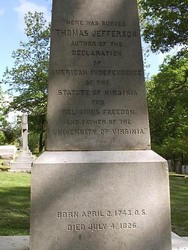Thomas Jefferson Died
|
| updated |
Copy Link Code
|
 What day did Thomas Jefferson die? On July 4th, 1826, exactly fifty years after drafting the Declaration of Independence, Thomas Jefferson died. Thomas Jefferson death date is not only ironic in its patriotic coincidence, but also because his old friend and chief political rival, John Adams, would die only hours later. How did Thomas Jefferson die? In the case of Thomas Jefferson, cause of death was a combination of illnesses including pneumonia that confined the frail 83-year old to his bedroom for the last months of his life. It has been recorded that Jefferson's last spoken words were, "Is it the fourth yet?" only hours before midnight on July 3rd. Passing away less than an hour after midnight on July 4th, the Thomas Jefferson date of death was immediately recognized as a powerful coincidence that gave greater weight to the legacy of the Declaration of Independence and its highly esteemed author. Thomas Jefferson obituary reports flooded newspapers around the country, but the funeral, in accordance with his own wishes, was kept small and simple and the Thomas Jefferson grave can still be found in the family cemetery at Monticello. As per another request, the Thomas Jefferson gravestone had another simple eulogy written by the man himself:
What day did Thomas Jefferson die? On July 4th, 1826, exactly fifty years after drafting the Declaration of Independence, Thomas Jefferson died. Thomas Jefferson death date is not only ironic in its patriotic coincidence, but also because his old friend and chief political rival, John Adams, would die only hours later. How did Thomas Jefferson die? In the case of Thomas Jefferson, cause of death was a combination of illnesses including pneumonia that confined the frail 83-year old to his bedroom for the last months of his life. It has been recorded that Jefferson's last spoken words were, "Is it the fourth yet?" only hours before midnight on July 3rd. Passing away less than an hour after midnight on July 4th, the Thomas Jefferson date of death was immediately recognized as a powerful coincidence that gave greater weight to the legacy of the Declaration of Independence and its highly esteemed author. Thomas Jefferson obituary reports flooded newspapers around the country, but the funeral, in accordance with his own wishes, was kept small and simple and the Thomas Jefferson grave can still be found in the family cemetery at Monticello. As per another request, the Thomas Jefferson gravestone had another simple eulogy written by the man himself:
HERE WAS BURIED THOMAS JEFFERSON
AUTHOR OF THE DECLARATION OF AMERICAN INDEPENDENCE
OF THE STATUTE OF VIRGINIA FOR RELIGIOUS FREEDOM
AND FATHER OF THE UNIVERSITY OF VIRGINIA.
Thomas Jefferson's death came only one year after the official opening of his masterpiece of higher learning and public education, the University of Virginia. Having designed every building on campus as well as the "Academical Gardens," Jefferson was enormously proud of the college he designed to advance the secular study of science and the arts on a public charter. The Virginia Statute for Religious Freedom was first written by Jefferson in 1777 but was only proposed in the state's General Assembly two years later and would not become law until 1786. After centuries of religious warfare and oppression in Europe and the New World, Jefferson understood the necessity for tolerance to preserve the unity of the States and the various ethno-religious groups throughout America. As evidenced by the Thomas Jefferson tombstone, he obviously considered this legislation one of his greatest achievements.
After the death of Thomas Jefferson, memorial statues and monuments went into design phase around the nation. His name is ubiquitous in the names of schools and in textbooks around the globe. Thomas Jefferson, born and died only five miles apart in the hilly Piedmont region of Virginia but remembered throughout the world as a hero of liberty and equality despite his active participation in the economy of slavery. The rival politician and fellow Founding Father who died on the same day, John Adams, had done just as much in the effort to forge a new nation out of the Thirteen Colonies but would never share the same light as Thomas Jefferson in the eyes of history. Still, one must wonder why Jefferson would not want his own tombstone to acknowledge his role as the third President of the United States.
